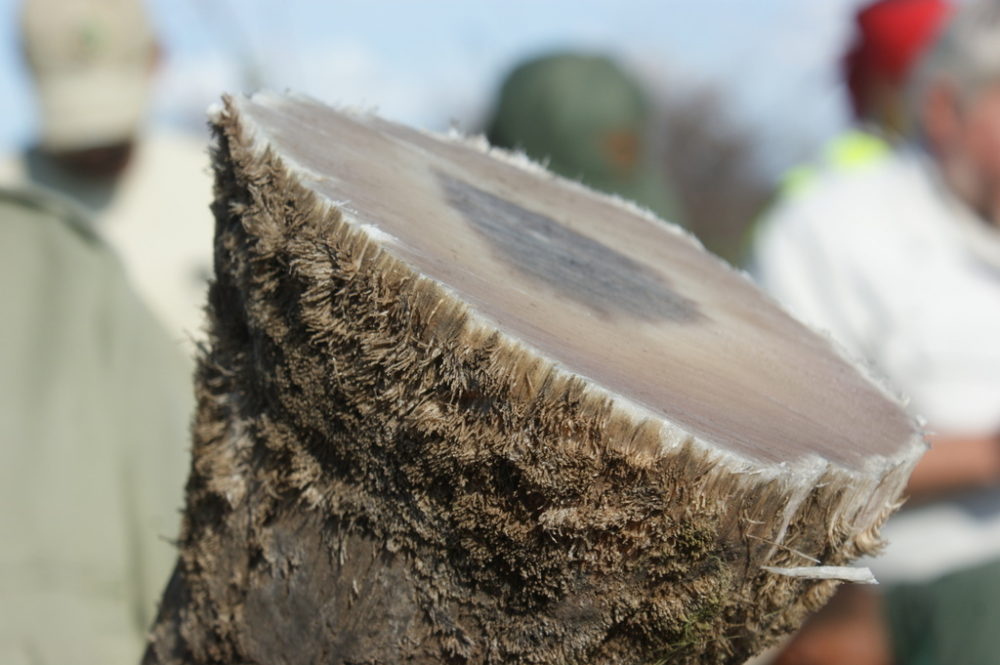On 26 November 2015, a South African judge lifted a ban on the domestic trade in rhino horn in South Africa, imposed by the government in 2009, after finding that the state had not followed the process of public participation before imposing the moratorium.
The ruling was delivered in the Pretoria High Court after two South African game breeders fought a legal battle to overturn the moratorium. John Hume and Johan Kruger who launched the legal action, say it is their constitutional right to sell rhino horn, which they describe as a renewable resource.
Shortly after the ruling was made public, the South African Minister of Environmental Affairs announced that the government would be appealing the court’s decision, meaning that today’s judgement is suspended, and the moratorium will not be lifted until the appeal is heard and then only if the decision is upheld. You can read the full statement from the Department of Environmental Affairs here.
Save the Rhino’s chief concern is that the domestic trade in rhino horn prior to the moratorium in 2009 led to a larger number of owners of rhino horn stockpiles, a proportion of which were investors rather than conservation managers, and that inadequate controls on this multiplicity of stockpiles facilitated “leakage” into the criminal trade in rhino horn. A report on the 2009 moratorium highlighted a shortfall of c. 1,800 kgs of what was expected to be held in stockpiles, according to estimates based on natural mortalities etc., and what was recorded in official records. Reopening the domestic trade in rhino horn within South Africa risks creating further opportunities for leakage into the illegal trade.
We believe that this step is being considered for financial rather than conservation reasons. We can see that rhino owners – state and private alike – are haemorrhaging cash with the increased costs of security, but if ownership of rhino horn is widened to investors, rather than simply game farm, reserve or park managers, there will be even more stockpiles to regulate and monitor, something the South African authorities have struggled with as it is.
Secondly, we’re puzzled by the judge’s comment that the moratorium’s role in adding to the surge in poaching could not be excluded. Does this mean that, prior to 2009, the legal domestic trade in rhino horns allowed sufficient “leakage” to satisfy illegal demand from overseas? If so, that leakage must have been significant.
If South Africa does submit a proposal to CITES to trade in rhino horn internationally, and it is rejected, what exactly will these investors do with their newly acquired rhino horns?
Overall, we would comment that it is widely supposed, though not yet confirmed, that South Africa will table a proposal to legalise the international trade in rhino horn for consideration at the 2016 CITES Conference of the Parties. In the face of extreme scepticism by many anti-trade proponents, it would seem wise for South African pro-traders to use these months to work with the government to iron out irregularities in the country’s stockpiles, to ensure that all stored rhino horn is properly DNA-profiled, micro-chipped, weighed, measured and inventoried, and to deal with the many abuses of the rhino trophy hunting system. Without demonstrating its ability to tackle long-standing corruption and inadequate record keeping, the chances of securing a majority vote at CITES seem remote.
To credit the “rhino farmers” who brought the court case: they affirm that they have rhino conservation interests at heart. One of the consequences of the heated debate over the potential legalisation of the trade in rhino horn has been to create divisions between those with different points of view. It’s important for us – including the general public – to remember that conservationists want to see increased rhino numbers in an increased number of viable populations spread throughout African range states. We can all agree on that, and no one should be put off supporting rhino conservation efforts simply because there is not a unified view on this particular issue.
Read more:
Killing for profit – Full court ruling document








